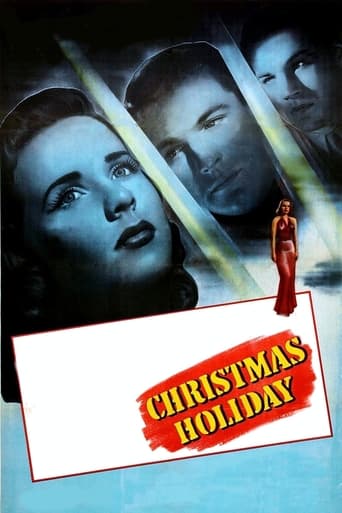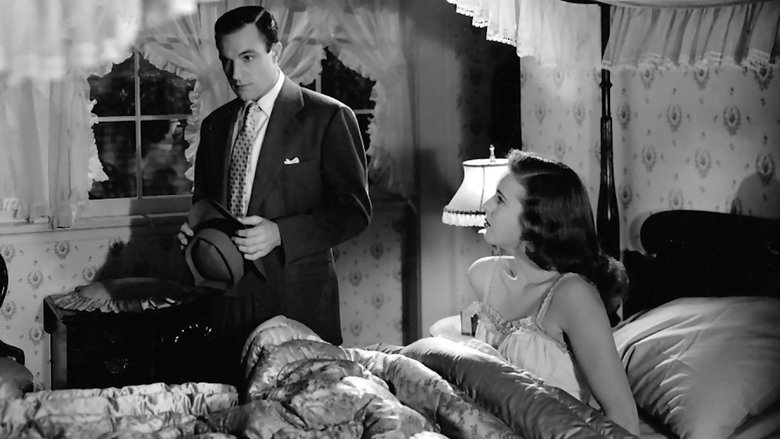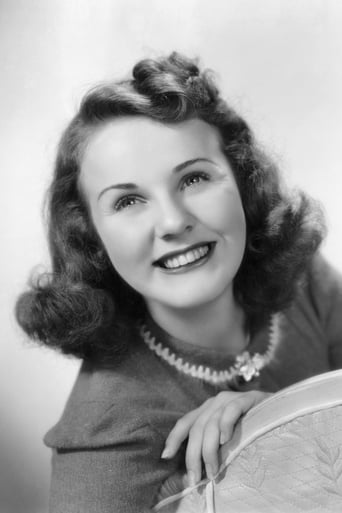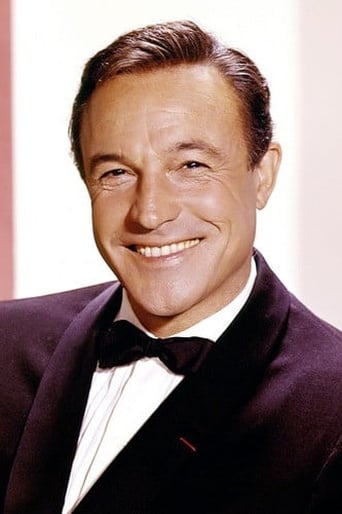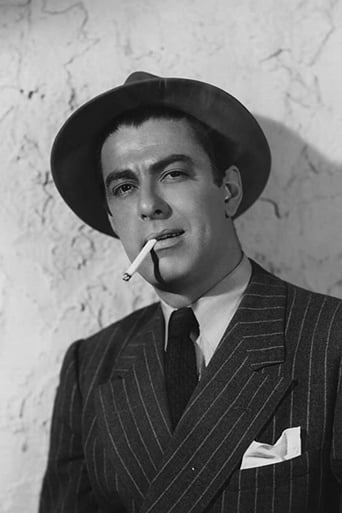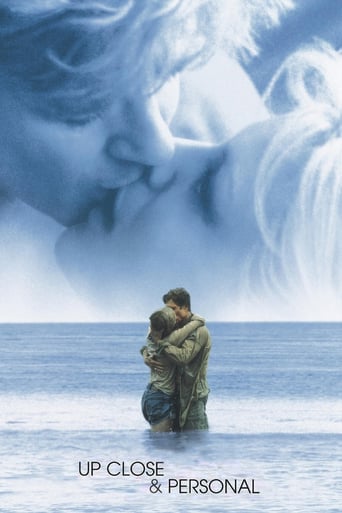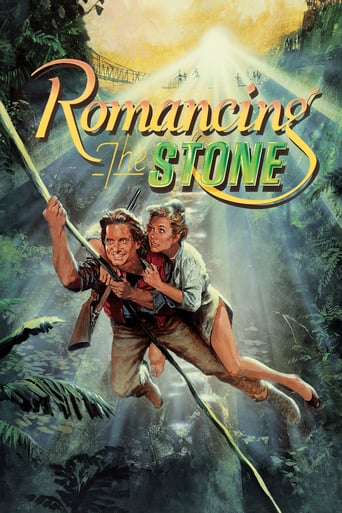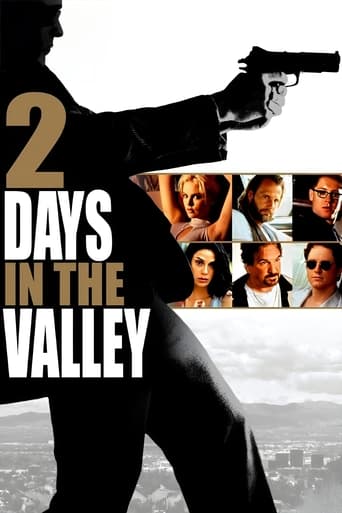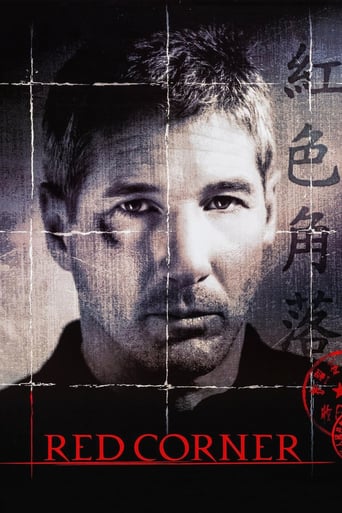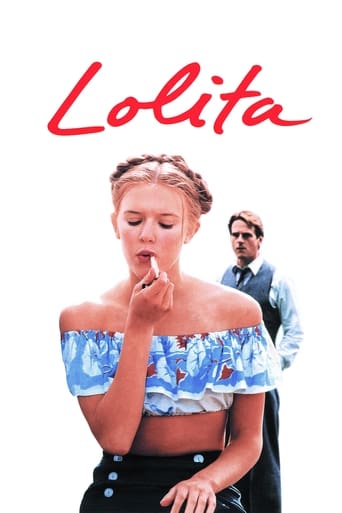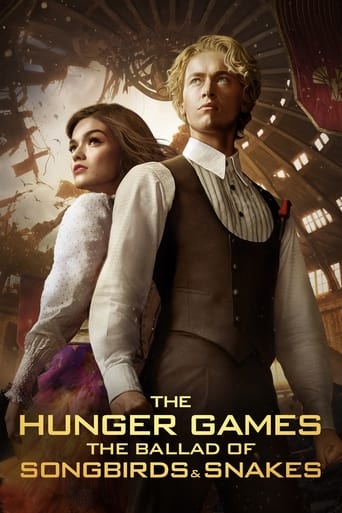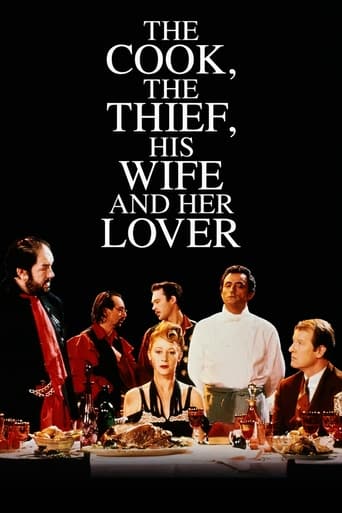Christmas Holiday (1944)
Don't be fooled by the title. Christmas Holiday is a far, far cry from It's a Wonderful Life. Told in flashback, the story begins as Abigail Martin marries Southern aristocrat Robert Monette. Unfortunately, Robert has inherited his family's streak of violence and instability, and soon drags Abigail into a life of misery.
Watch Trailer
Free Trial Channels
Cast


Similar titles
Reviews
A Brilliant Conflict
Let me be very fair here, this is not the best movie in my opinion. But, this movie is fun, it has purpose and is very enjoyable to watch.
The film's masterful storytelling did its job. The message was clear. No need to overdo.
The movie really just wants to entertain people.
I saw the last two scenes of this strange film when I was living in Germany. When American films are shown in Germany, and they have music, the dialogue is dubbed, but the songs remain in English. I always wanted to see the whole thing.Don't be fooled by the title "Christmas Holiday." This 1944 Universal film is no Christmas movie, but instead, a quasi-psychological story of obsessive love and guilt. Sounds just like a Deanna Durbin movie, doesn't it?Durbin here plays Jackie Lamont, who tells her story to a soldier, Charles Mason (Dean Harens) grounded in New Orleans during bad weather. He's received a telegram from his fiancée telling him she's married to someone else, but he's decided to take his Christmas leave in San Francisco anyway, possibly to confront her. When he can't leave New Orleans, a newspaperman, Simon (Richard Whorf) takes him to a club, Maison L'affite, run by Valerie (Gladys George). Jackie is a singer there and, like the other women who work there, talks to the male guests. There's a strong implication that they do something else for the male guests as well, but the code is in place so no one comes out and says it.At her request, Charles takes her to midnight Mass - I haven't heard a mass in Latin in decades - where she breaks down. Afterwards, she explains that she is in reality Abigail Martin, the wife of Richard Manette (Gene Kelly), in prison for killing a bookie. She tells him the whole story of how in love with him she was and still is, how they met at a concert, and how his mother (Gale Sondergaard) obviously knew something Abigail didn't know: that Richard was a charming, scheming, thieving weakling, and she was hoping Abigail could change him. She didn't.One night he comes home with blood on his trousers and a lot of dough. It's not long before he's put on trial for murder and found guilty. His mother blames Abigail, and Abigail changes her name to Jackie and goes to work at the club, apparently as some sort of punishment.This is pretty heavy going. It's suggested by a Somerset Maugham story - he wasn't known for light comedy. The casting of Durbin and Kelly is certainly interesting, plus the name. Imagine walking into a movie theater knowing nothing about this movie. You would assume you were about to see a cheerful musical.Durbin sings "Spring Will Be a Little Late This Year," and "Always," which she does beautifully. She was a good actress and able to pull off the drama.Kelly is a charmer in the beginning and then reveals his true colors. He was good, as was Gale Sondergaard.The theme from Tristan & Isolde is played at the concert and at the end of the film. Always surprises me to hear Wagner in a film made during World War II, because all the German arias were taken out of the compilations of arias for various voice types during the war. Nevertheless, it's quite an arresting theme. Tristan & Isolde is similar, and predates, the legend of Arthur, Guinevere and Lancelot. Its theme doesn't seem to have much to do with this movie.Deanna Durbin would leave films four years later and told an interviewer once that Universal was giving her worse and worse films. Given how much money she had made for them, the powers that be never knocked themselves out finding her good material."Christmas Holiday" is an aberration, but so odd and so oddly cast that it's worth seeing. I love Deanna, and I'll take her any way I can get her.
This is a strange noir, made even more so by the odd casting of the usually wholesome Deanna Durbin and Gene Kelly as a barely-disguised 'floozie' and an inveterate gambler and murderer respectively! Besides, the title is most ironic since, while it does revolve around just that occasion, the main narrative (which unfolds in flashback, a typical genre device, I might add) hardly evokes a feeling of good cheer – incidentally, this is possibly the only film set around this time of year to depict the Midnight mass traditionally held on Christmas Eve! Christmas HOLIDAY, then, was only director Siodmak's second noir: the result is somewhat pretentious for a movie from this vintage, yet this very quality has helped render it less dated than others of its ilk! I should point out that the late eminent British film critic Leslie Halliwell resented the script's approach to the source material – but, while this is unusually billed in the opening credits as "W. Somerset Maugham's Christmas HOLIDAY as written by Herman J. Mankieiwicz", the author himself was reportedly enthusiastic about the screen rendition!For the record, I own 10 vehicles by the female lead (who actually initiated the project in an effort to change her child-star image!) but, more by accident than design, this is the first I have watched – and it appears that, not only was the film her personal favorite but also, in her opinion, the only worthy one she ever did! Incidentally, she would again dabble in the thriller genre with the more modest but still interestingly-cast LADY ON A TRAIN (1945), which I do have a copy of. By the way, the actress (who retired from the screen way back in 1948!) has just turned a venerable 90 years old in December! With respect to Kelly, this was his seventh picture (having debuted just 2 years previously) and, in his case, too, he would appear in only one other title in this vein i.e. BLACK HAND (1950), which I have also acquired some time back but have yet to catch up with. As for how the two fare within this seedy/gloomy environment, Kelly is quite good as a ne'er-do-well but Durbin (even though the studio bosses forced her into a couple of numbers – Frank Loesser's "Spring Will Be A Little Late This Year" and Irving Berlin's "Always", with the latter essentially turned into a motif throughout – to appease her established fan-base!) is surprisingly excellent.Anyway, the plot involves Durbin and Kelly meeting at a concert (the 'Love/Death' theme from Richard Wagner's opera "Tristan And Isolde" – also effectively reprised here for the finale – which, for my money, has been immortalized in two Luis Bunuel films!) and immediately falling in love. When he takes her home to meet his mother (Gale Sondergaard in one of her best roles), the latter realizes the girl (who obviously is unaware of his character foibles) can help her make an honest man of her boy. However, events take a tragic turn as Kelly kills a man in a dispute over money, is caught, tried and condemned. Sondergaard, whose feelings for her son go far beyond motherly love(!), takes it out on Durbin for having failed her – which sends Durbin on her path to perdition (self-imposed, really, so as to be herself in a prison of her own making!) which is how we first see her, offering solace at a New Orleans "joint" to a soldier who has his own beef against love (in fact, he was on his way home to take revenge upon the fiancée who had just jilted him!).Other prominent characters are the proverbial madam-with-a-heart-of-gold played by Gladys George and Richard Whorf as the sleaziest figure of all, a muck-racking reporter who also operates as something of a pimp in the latter's establishment! The climax, then, sees Kelly escape from prison and (understandably) misconstruing Durbin's particular method of expiation: however, the Law is soon on his tracks, and he dies in a shoot-out with the Police – his dying words to his wife, finally appreciating the nature of her sacrifice, are "You can let go now, Abigail" (promptly reiterated by the young soldier, looking on).
Lt Mason (Dean Harens) is returning home when his plane has to make an emergency landing. On an overnight stay, he has an encounter with Jackie/Abigail (Deanna Durbin) at a nightclub where she reveals her past to him. She is married to Robert Manette (Gene Kelly) who is serving time for murder. They spend an evening together before Lt Mason continues on his journey. However, Manette has escaped from jail.....This is a film noir with unlikely lead roles going to Durbin and Kelly who are more noted for appearing in annoying musicals. Surprisingly, it works. Kelly doesn't do any cheesy, smiley, grinning dance moves where he sticks his bum out, and Durbin sings a couple of songs that are actually quite good. The film is slow to get going - think half an hour - which grants the viewer a right to question what on earth is going on and to get slightly bored. But, once the flashbacks begin, we have a story to follow and both my girlfriend and I far prefer Gene Kelly as a baddie.
DEANNA DURBIN begged Universal to let her play a dramatic role after her great success in a string of mostly mediocre films where she played a Little-Miss-Fixit in featherweight romantic comedies who sang operatic ditties with great skill and charm. She was always involved in a scheme to reunite her mother and father for the final clinch.Here, she handles her very adult role with competence, quite believable as a torch singer in a disreputable nightclub, a troubled woman seeking redemption for problems in her twisted past relationships with a mother and son (GALE SONDERGAARD and GENE KELLY).Deanna shines in the role, giving it shades of both simplicity and charm while playing the happy bride, but convincing when she becomes the bruised and fragile woman who manages to tell her tale of woe to a young lieutenant. The soldier is nicely played by DEAN HARENS, an officer on Christmas leave who is on his way to San Francisco when a storm forces his plane to land in New Orleans. The film structure is not always smooth, burdened as it is by a couple of flashbacks in the middle and a rather weak ending that is over too abruptly. But Robert Siodmak and cameraman Woody Bredell give the whole piece a fluid style with long tracking shots and superior cinematography for several key scenes, notably the one that takes place at a church service on Christmas eve, and another in a concert hall.Durbin's fans will certainly appreciate her rendering of "Spring Will Be A Little Late This Year" and Irving Berlin's haunting ballad "Always." The background music, a mixture of popular songs and classical pieces, is effective, especially for all of the nightclub scenes. Hans J. Salter deservedly won an Oscar nomination for his detailed and meticulous score.Effective supporting performances from GALE SONDERGAARD, GLADYS GEORGE and RICHARD WHORF strengthen the tale. Well worth watching. Oddly enough, Deanna handles her dramatic chores in much better style than Gene Kelly, who's unable to do much with his role of a weak-willed wastrel who turns to crime for reasons unexplained.Trivia note: David Bruce has a small role at the beginning. Two years later he'd be co-starring with Deanna in much bigger parts in CAN'T HELP SINGING and LADY ON A TRAIN.

